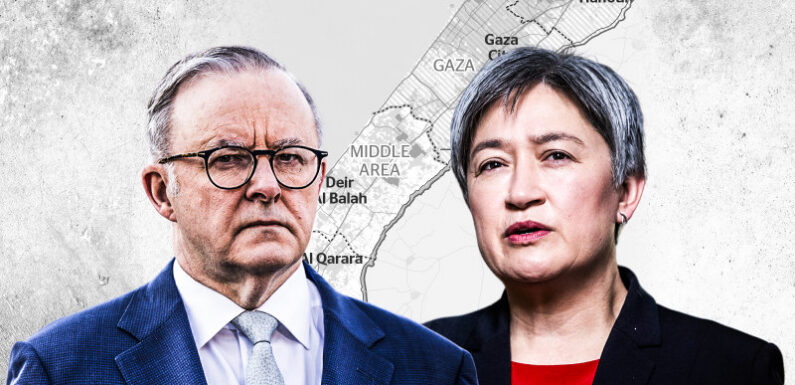
Save articles for later
Add articles to your saved list and come back to them any time.
Anthony Albanese and Penny Wong took their Labor colleagues by surprise with their sudden move to support an immediate ceasefire between Israel and Hamas.
Caucus members were expecting the prime minister and foreign minister to side with the United States or repeat their decision six weeks ago when Australia abstained on a similar United Nations resolution.
Anthony Albanese spent weeks negotiating a statement with New Zealand Prime Minister Christopher Luxon, left, and Canadian Prime Minister Justin Trudeau, right, that warned against an Israeli siege or blockade in Gaza.Credit: Getty, AP, Alex Ellinghausen
Albanese and Wong made a big call instead. They chose to amplify Australian concern at the growing humanitarian disaster in Gaza. They made this call in great secrecy, which meant others in the government only learnt the news when they woke on Wednesday morning, but they had to act with great care.
Caucus members disagree about the outcome because some lean to the Israeli view while others are acutely aware of the Palestinian deaths. This makes it easy for Labor’s conservative critics in the media to play up a caucus split.
One essential point about the “divided Labor” narrative is that the caucus reflects the community. It has Jewish members such as Attorney-General Mark Dreyfus and Melbourne backbencher Josh Burns. It has Muslim members such as Industry Minister Ed Husic and Childhood Education Minister Anne Aly.
The Liberals, with a more homogenous party room, side with Israel. The Greens, with a history in progressive politics, side with Palestine. This makes Labor the only major party that seeks to reconcile competing views on an incendiary foreign policy question that has defied resolution for decades.
Wong describes the latest vote as “consistent” with government policy, rather than marking a sudden break. She is right in the sense that she called for “steps towards a ceasefire” on November 12 and this new resolution demands an immediate ceasefire.
In truth, however, there has been a shift. Australia abstained on a call for a ceasefire at the UN on October 28 because the resolution did not condemn Hamas for its terror attacks on Israel on October 7. Australia voted in favour of the latest resolution even though it does not condemn the October 7 attacks either.
In fact, the resolution does not mention Hamas at all, so it is weak on the terrorism that sparked this latest conflict.
Husic, born in Sydney of Bosnian Muslim parents, has been increasingly pointed about the need for a ceasefire. Burns, whose grandmother fled Nazi Germany, is in Israel this week and says a ceasefire cannot be a “one-way” outcome.
The discussion within the government and the caucus is muted, however. Decisions are centralised and debate is discouraged at the weekly caucus meetings that are usually leaked to the media. A vote at the UN is not treated as a decision for the caucus or the cabinet, so few are consulted.
Wong made sure the Israeli and US governments knew the Australian vote was coming. She also positioned Australia alongside friends and allies such as Canada, New Zealand, Japan, South Korea and Singapore – all voting in favour. The United Kingdom abstained. While the US voted against the resolution, US President Joe Biden has become steadily more critical of Israel over the civilian deaths in Gaza. It would be wrong to present this as an Australian rift with the US.
Albanese, meanwhile, spent weeks negotiating a statement with the prime ministers of Canada and New Zealand that warned against an Israeli siege or blockade in Gaza. Importantly, the statement calls on Hamas to release all hostages and stop using Palestinian civilians as human shields. It says there is no role for Hamas in the governance of Gaza.
Albanese wanted other leaders to sign the statement as well, and was pursuing the idea four weeks ago at the APEC leadership summit in San Francisco. He was keeping Australia involved in a global discussion to end the hostilities.
In contrast, the response from Coalition defence spokesman Andrew Hastie has a breathtaking simplicity: a ceasefire would only give Hamas time to regroup and strike Israel again.
“When locked in combat, you don’t allow your enemy to rest. You finish the job,” Hastie says in a four-line statement. There is no mention of the thousands of civilians being killed or wounded while that job is under way.
Labor has an immense challenge in settling its internal disputes over Israel and Gaza. The party’s “friends of Palestine” group has been steadily winning votes in Labor branches to call for a stronger position on the need for a ceasefire. In the caucus, however, most MPs avoid going public because they want to keep the peace with the leadership.
The government is being faulted on the left and right. The Liberals say it is too soft on Hamas, the Greens say it is too soft on Israel. There are shades of those opposing views within the Labor caucus as well, albeit without the ferocity. But the caucus reflects the community. As public debate rages, Labor unity will be sorely tested.
Cut through the noise of federal politics with news, views and expert analysis from Jacqueline Maley. Subscribers can sign up to our weekly Inside Politics newsletter here.
Most Viewed in Politics
From our partners
Source: Read Full Article
